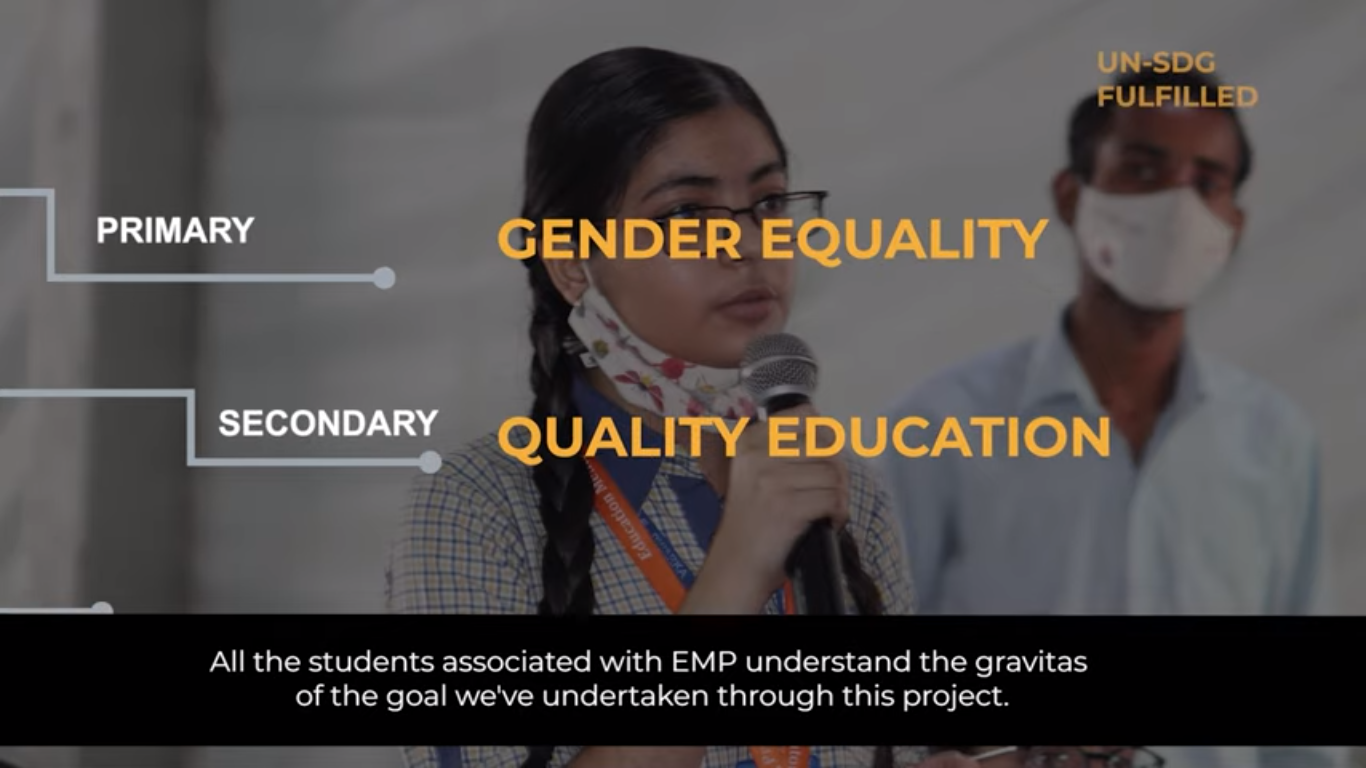
Introduction
The Education Mentoring Programme, was launched to abridge the chasmic gap between male and female representation in the STEM workforce.
It has been observed that the female dropout rate from STEM after senior secondary schooling is astronomically high due to a plethora of social and economical reasons. This has led to a skewed STEM demographic, birthed from discrimination and prejudice. Women have been deprived of opportunities and resources to pursue STEM because society, at large, questioned their scientific calibre. As we strive towards an equitable and holistic society, it is imperative that we also let go of such unfair notions and provide women with the previously gate-kept support and guidance.
This Programme endeavours to integrate more and more young school girls into the strata of STEM Higher Education by imparting guidance through hand holding initiatives of college students. Continuous aid can help bolster one’s morale and assist them in soaring towards their goals. Through EMP, IGDTUW hopes to harness the true potential of countless girls aspiring to enter the STEM field and inculcate strong skills into their students. EMP aims to establish a dynamic relationship between the Mentor and Mentee where there is mutual growth and development.
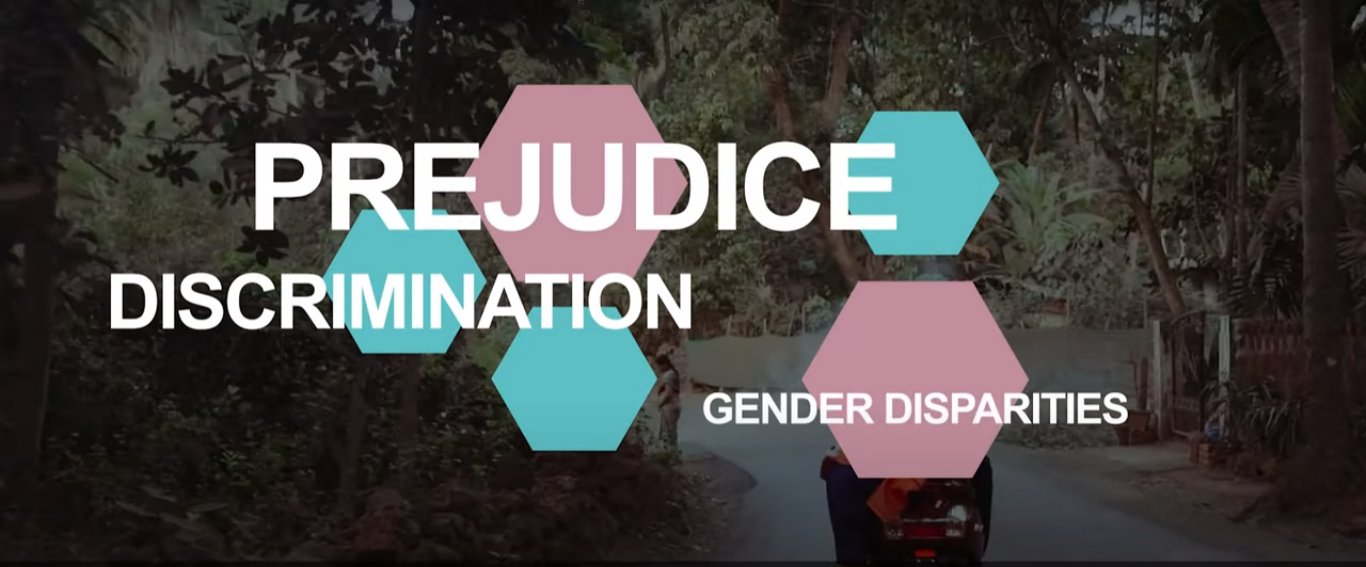
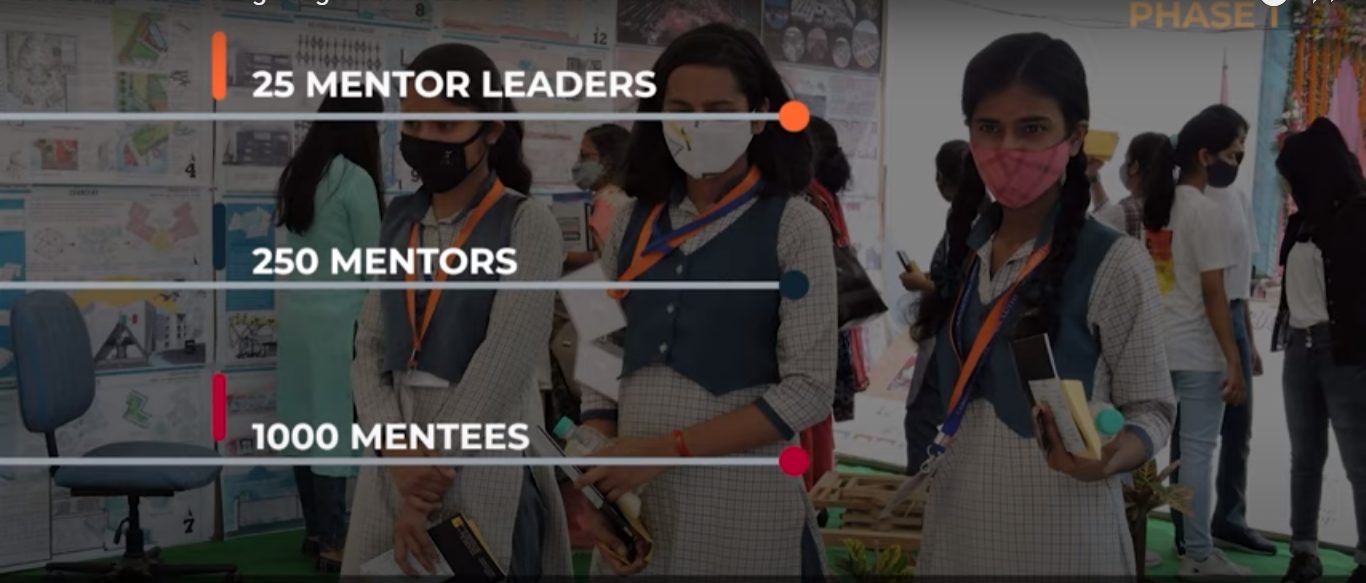
"It was an excellent program as I, for the first time in my life, became able to communicate with another person with whom I shared my dreams and my views towards my passion. The most amazing thing for me was that it was the first time, ki kisine mujhe encourage kiya psychology me career banane k liye. I'm now very motivated and confident. I'm grateful to all of you. Thank you very much, I'm not going to let all your efforts go in vain. It's my promise, I'll give my 100% and become a responsible citizen of our country."
-Anjali Vishwakarma (Mentee)
Launching of EMP
Education Mentoring Programme was launched on March 20, 2021.
The Launch Event was accompanied by a Q and A Session. Different exhibition stalls were also prepared by IGDTUW students. Different teams of Mentor Leaders were deployed for implementation of the launch event.
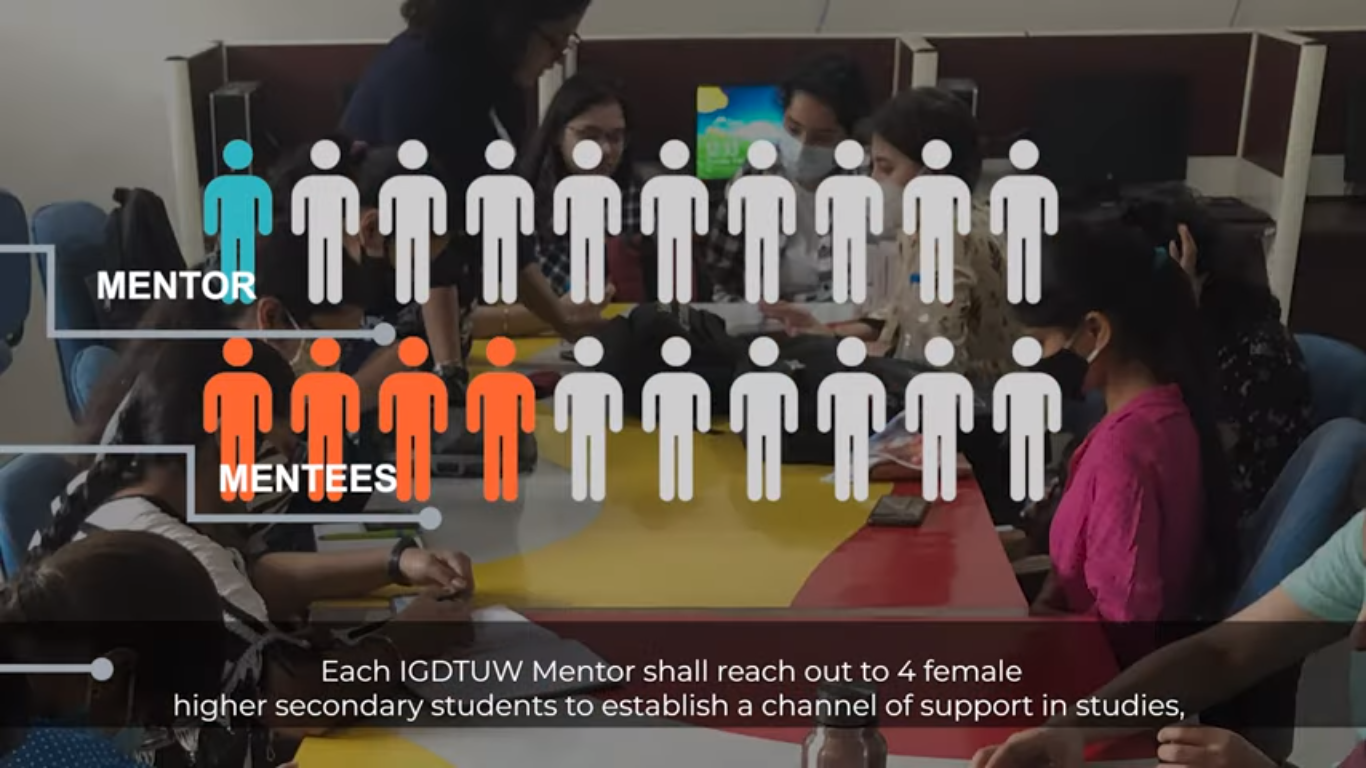
All Mentor Leaders were continuously briefed by the Core Faculty Members.
The Education Mentoring Programme endeavors to integrate more and more young school girls into the strata of STEM Higher Education by imparting guidance through hand holding initiatives of college students. Continuous aid helps bolster one’s morale and assists them in soaring towards their goals.
The Education Mentoring Programme was launched to abridge the chasmic gap between the male and female representation in the STEM workforce. Through the efforts of IGDTUW students, we aim to contribute towards fixing the skewed STEM demographic, birthed from discrimination and prejudice.
Programme
The Education Mentoring Program (EMP) at IGDTUW is a dynamic initiative that facilitates mentorship relationships between university students and schoolgirls from economically disadvantaged backgrounds. The program seeks to empower these schoolgirls in grades IX to XII by inspiring them to pursue higher education, with a particular focus on STEM (Science, Technology, Engineering, and Mathematics) fields. EMP is a comprehensive platform that not only imparts academic guidance but also nurtures values like empathy, compassion, and perseverance.
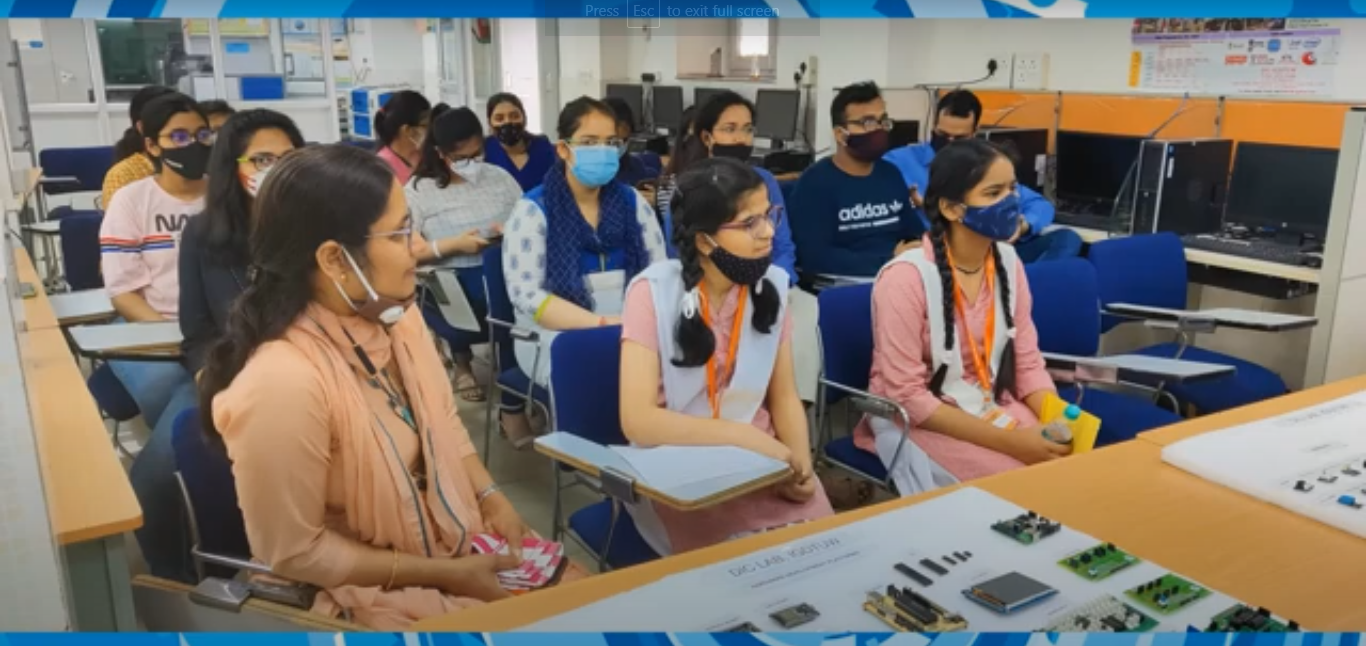
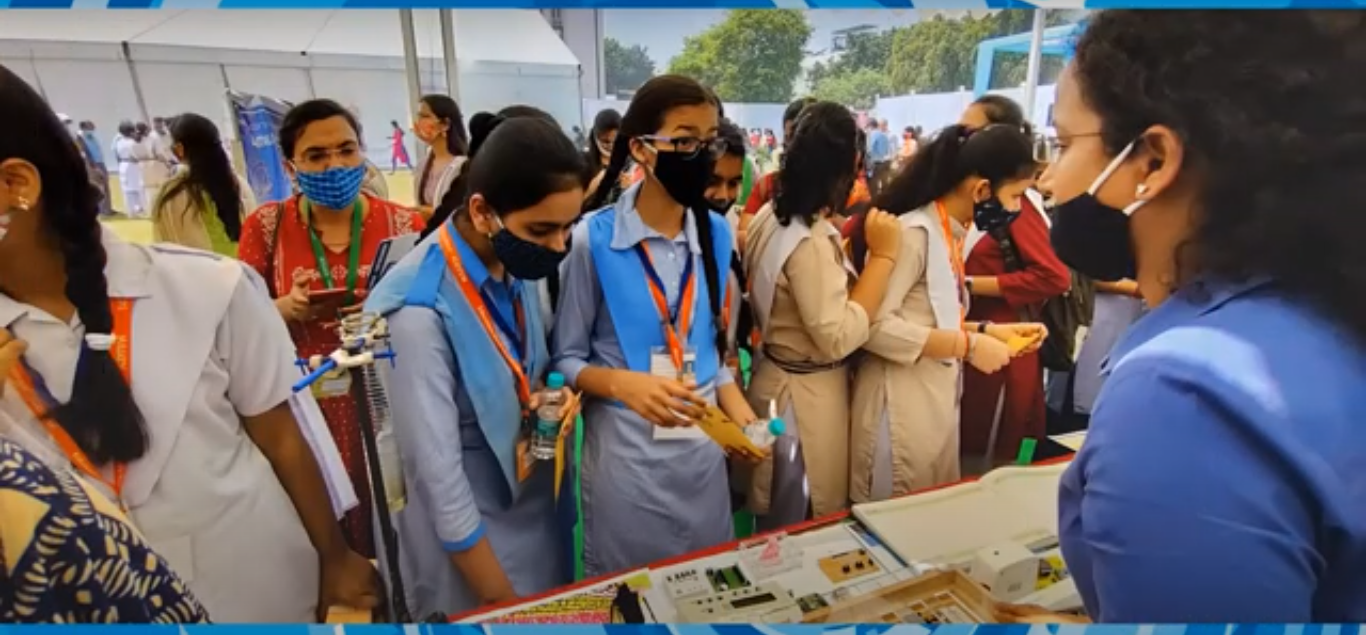
Goal
EMP's primary goal is to bridge the gender gap in STEM education by motivating and supporting schoolgirls from underprivileged backgrounds. By developing one-on-one mentorship relationships, the program aspires to empower these girls, nurturing their self-confidence and academic performance, thus opening doors to higher education opportunities. The ultimate aim is to create a more inclusive and equitable society by fostering a deep-seated belief in the significance of women's participation in STEM fields.
Intervention Area
The program operates in the Delhi region and targets schoolgirls in grades IX to XII who come from economically weaker sections of society. These girls often face challenges accessing quality education and lack awareness about opportunities in STEM fields. EMP intervenes directly in their lives, providing mentorship, academic support, and personal growth, offering the skills and knowledge needed to pursue higher education in STEM disciplines.
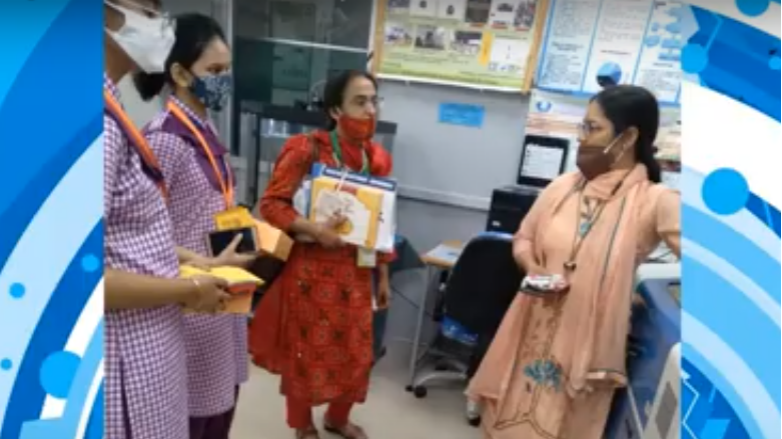
Implementation Strategy Executive Echelon
EMP's implementation strategy is structured around different teams, ensuring a well-organized approach. The program is overseen by the Project Management Unit (PMU) led by IGDTUW's Hon'ble Vice Chancellor, which provides overarching guidance. Mentor Leaders, highly motivated students, undertake extensive training and facilitate the training of Mentors, who, in turn, engage directly with the Mentees.
LEADERSMENTOR
LEADERS
Executive Echelon followed at IGDTUW for EMP Implementation
- PMU: This core faculty unit oversees the program's operations. Mentor Leaders: These individuals guide and train Mentors and manage the program's day-to-day activities.
- Mentor Leaders: Assist the Mentors through provision of resources and information. Continuously track and evaluate the Mentor’s progress.
- Mentors: University students who establish one-to-one mentorship relationships with the schoolgirls, offering academic support and personal growth.
- Mentees: Schoolgirls in grades IX to XII who benefit from the mentorship, academic guidance, and exposure to STEM education.
By nurturing these interlocking teams, EMP ensures a well-rounded and effective mentorship program that drives lasting change for the schoolgirls and enriches the university students' own learning experience.
Timeline Establishment & Expansion
-
Jan 2021Conceptualisation and Proposal Formulation by IGDTUW Faculty
-
Feb 2021
Scheme Design
- Initial Ideation Meeting
- Finalisation of Proposal and Budget
- Mapping of Mentors and Mentees
- Zone-Wise Allocation of Mentors and Mentees
-
Mar 2021
Selection of Mentor Leaders
- Preparation for Launch Programme
- Invitation to Stakeholders
- Generation of Resource Materials
- Preparation of SOP for Mentors
- Generation of Forms for Baseline Survey
- Division of Mentor Leaders into Respective Teams
- Gearing Up for Implementation
-
Apr 2021
Project Roll-Out
- Analysis of Baseline Survey, Bonding Between Mentors and Mentees
- Tackling Problems in Real Time
-
July 2021 OnwardsLaunch of Desh ke Mentor Aplication
Pilot Phase Launch 01 APR 2021 - 31 AUG 2021
Number of Mentors
Number of Mentees
Number of Calls Made
Impact on EMP/DKM
Phase 1: SEP 2021 - DEC 2021
Number of Mentors
Number of Mentees
Number of Calls Made
Phase 2: JAN 2022 - JUL 2022
Number of Mentors
Number of Mentees
Number of Calls Made
Phase 3: AUG 2022 - July 2023
Number of Mentors
Number of Mentees
Number of Calls Made
Impact Assestment Impact on Mentors
The Mentors from IGDTUW were regularly evaluated through Base-line as well as End-line Survey to track their progress and understand the impact felt by them during the course of Education Mentoring Programme.
Awareness
-
BeforeAfter
-
Aware of the academic needs of students in STEM
-
Aware of the challenges faced by women
-
Need for addressing social issues
-
Women empowerment is vital for a better society
Personality Development
-
BeforeAfter
-
Improved Emotional Quotient
-
Better understanding of social responsibilities
-
Enhanced Social Leadership skills
-
Overcame prejudice and bias
Communication Skills
-
BeforeAfter
-
Developed Empathetic Listening
-
Better Self Expression
-
Comfort Felt with the Mentees While Communicating
Time Management
-
BeforeAfter
-
Improved Time Management Skills
Impact on Mentees
The Mentees (Female Students) from various Delhi Government Schools were regularly evaluated through Base-line as well as End-line Survey to track their progress and understand the impact felt by them during the course of the Education Mentoring Programme.
Awareness
-
BeforeAfter
-
Increased Awareness about Future Goals
-
Increased Awareness about Timeline of Target Exams
-
Increased Awareness about Syllabus of Target Exams
-
Increased Awareness about Paper Patterns
-
Increased Awareness about Resources for Target Exams
-
Increased Awareness about Mocktests for Target Exams
-
Increased Awareness about Financial Support Availability
Personality Development
-
BeforeAfter
-
Better Self Expression Skills
-
Increased Ambition for Pursuit of Higher Education
Communication Skills
-
BeforeAfter
-
Enhanced Communication Skills
-
Increased Ability to Develop Friendship Bond with The Mento
-
Enhanced Active Listening Skills
Time Management
-
BeforeAfter
-
Increased Ability to Manage Time Efficiently
-
Awareness About Effective Timetables for Preparation
-
Better Preparation Using Timetables
Stories of Change
The Pilot Phase of EMP was the real learning phase in itself. I learnt through the process and understood the importance of the program. The one-to-one interaction with mentees was important and also much needed for both the mentors as well as the mentor leaders to get a ground check of problems and how to tackle them. My experience with my mentors was nice and we had our own ups and downs but everyone emerged out stronger and satisfied about having done their part well. Personally, it has made me more empathetic and aware of the challenges around me.
I'm incredibly proud to be a part of The Education Mentoring Programme as it transformed from a simple volunteer programme to a ground-breaking initiative supporting underprivileged girls. The last eight months have been quite gratifying and enlightening. As I developed into a more self-assured, tolerant, and driven person, it was encouraging to watch my team of mentors steadily improve their personalities and leadership abilities as their mentees benefited from this relationship. In a word, EMP has given me the possibility to overcome social constraints and improve the world by establishing education as a universal right rather than a luxury.
Anju, a mentee under the Desh Ke Mentor (DKM) from RPVV Del hi Government school felt that she had the appropriate skill set but was facing challenges with career goal setting. Her DKM mentor Richa from Delhi Pharmaceutical Sciences and Research University helped Anju actualize her goal of becoming an Engineer. Anju, now a student at IGDTUW, carries her mentor's legacy forward by mentoring 4 more girls under DKM.
Anoma, a student of SKV Del hi Government School was hand holded by her DKM mentor Megha, from IGDTUW in cracking JEE. Anoma is now studying CSE at IGDTUW. She is now mentoring 4 more engineering aspirants from Delhi Government Schools under DKM.
Deepti, a student of SV Delhi Government School came i n contact with her mentor Tanya throug h the DKM Prog ram. Tanya, a student at IG DTUW hel ped her im prove her self-awareness and strengths. Just like her mentor. Deepti is now studying at IGDTUW and mentoring 4 more girls of Delhi Government Schools. She entitles the credit to Desh Ke Mentor Program.
Gayatri, a student of RPVV Delhi Government School was struggling to find her way forward. Her DKM mentor Preksha. from IGDTUW became her friend and guided her in career exploration. Just like her mentor,Gayatri is now an IGDTUW student mentoring 4 more Delhi Government school girls to reach their dreams.
The first round of the education mentorship programme has been a tremendous learning opportunity. I have personally come to understand that I am capable of changing things. It has also made me more aware of the needs of girls seeking STEM education. My horizons have been broadened, and I now want to get more active in comparable humanitarian concerns. That seems like a personal accomplishment to me since I've spoken to practically all of the mentees and seen how well they get along with the mentors and how EMP has given them a completely new direction.
I have talked to the mentees as well, whenever they faced issues which were other than their studies and career. The girls have shared their problems, and I somehow have given my best to provide the most practical solutions. In difficult times of mentors, when they were not able to make calls due to their personal reasons, I have motivated them, and that in turn incentivized me because, I realized that I have the quality to help someone and inspire them to a level that they can begin their journey from scratch again.
During the Pilot Phase of EMP, I underwent a profound learning experience that highlighted the programme's significance. The one-onone interactions with my mentees proved to be crucial, enabling both mentors and mentor leaders to gain a solid understanding of the issues at hand and how to effectively address them. Throughout the programme, I thoroughly enjoyed spending time with my mentors, and although we encountered some challenges along the way, we emerged stronger and with a sense of pride in our accomplishments. This experience has had a personal impact on me, increasing my empathy and awareness of the difficulties that individuals face.
This program has come to an end. I have been provided with the knowledge of Undergraduate Courses, Universities, DU and DSEU available courses (both diploma and degree) and scholarships for future support. My mentor has been patient and gave her best to solve my confusion. A plus point, in this program is that I got a new friend who is also a guide for me. I am in for the next phase.
Wow, What a Programme! I found this Programme more effective in my life as it provided me with a lot of mental support. There is a lot of mental pressure and depression in students my age but my mentor helped me a lot in coping with this stuff. This program is really beneficial for teens so it should be compulsory for all teens studying in high schools.
I have a very good experience of the Pilot Phase of EMP and I got a lot of advantage from this Programme. I honestly feel that EMP was so good that I did not want it to end. I got a new friend for life through this Programme and that is my Mentor jinke saath main apne saare doubts aur difficulties share karti hu aur mujhe answer bhi milta hai about how to overcome them. I think EMP doesn't need any changes and it is the best.
This programme is very good for the people who don't know what to do after the 12th. And if they know then they don't know how to approach it. This programme has really helped me a lot to clear my doubts, especially about target exams. Mentors are so good, they talk to us like they are talking to their younger sister. I haven't had felt any nervousness in front of her.
My experience has been well with the pilot phase of EMP because before this I didn't know about different types of fields in engineering, now I know many fields very clearly. I have thought about 3-4 fields in engineering based on my skills and interest and now I want to select one of them and just want to focus on that field. I am very grateful to my mentor that she has given me many resources and helped me. She has also clarified my doubts very well and she has always tried to talk with me as a friend. That's why I was able to talk to her, with di I felt that she is my elder sister who is guiding me about my future. I am always thankful to her.
It was an excellent program as I, for the first time in my life, became able to communicate with another person with whom I shared my dreams and my views towards my passion. The most amazing thing for me was that it was the first time, ki kisine mujhe encourage kiya psychology me career banane k liye. I'm now very motivated and confident. I'm grateful to all of you. Thank you very much, I'm not going to let all your efforts go in vain. It's my promise, I'll give my 100% and become a responsible citizen of our country.
To see The Education Mentoring Programme evolve from being just a volunteering program into a revolutionary program aiming to support the underprivileged girl child makes me extremely proud to be a part of it. The past 8 months, have been quite enriching and fulfilling. While I grew myself into a more confident, patient and determined individual, it was heartening to see my team of mentors, gradually enhancing their personalities and leadership skills with mentees learning and gaining from this association. In a nutshell, EMP has given me a chance to break beyond the barriers of society and make the world a better place where education is not just a privilege, it's a right for all.
I've become motivated and more confident about my studies. More meetings where we can interact with others will be very beneficial to us school students. Resources and information about extracurricular activities would also help a lot.
I'm very happy to be a part of The Education Mentoring Programme as it develops from a straightforward volunteer programme into a groundbreaking programme for underprivileged girls. It's been a really rewarding and educational eight months. It was great to see my team of mentors slowly strengthen their personalities and leadership skills as their mentees benefited from this connection as I grew into a more selfassured, tolerant, and determined person. In other words, by making education a universal right rather than a luxury, EMP has given me the chance to transcend societal limitations and make the world a better place.
The Education Mentoring Program is something I adore. I didn't know what to expect when it initially started. I only volunteered my time. The final result was a tonne of possibilities for learning, a feeling of togetherness, and friendships that seem like they might last forever. The best aspect of EMP's mentoring programme was that everyone got the chance to utilise their abilities to the utmost. Because of the team format, it was both useful and fun. I'm glad I suggested joining The Documentation Team. I got the chance to record everything starting at the beginning on video. I used my camera to document how it changed from being a concept to being a reality.
"Two learn when one teaches" I have a lot of affection for the Education Mentoring Program. When it first began, I had no idea what to anticipate. I merely gave my time voluntarily. That eventually resulted in a tonne of learning opportunities, a sense of camaraderie, and friendships that seem like they may endure forever. On the mentorship side, the nicest thing about EMP was that everyone had the opportunity to utilise their skills to the fullest extent. The team structure made it both practical and enjoyable. I'm happy that I offered to join The Documentation Team. I had the opportunity to videotape everything from the beginning. I have watched it develop from an idea to reality with the help of my camera.
The first stage of the education mentorship programme has given a plethora of information. I've personally learned that I have the ability to bring about change. It has also made me more aware of the prerequisites for female STEM students. My viewpoints have changed, and I now want to engage in relevant humanitarian causes more actively. That seems like a personal victory to me since I've spoken to almost all of the mentees and seen how well they get along with the mentors and how EMP has given them a completely new direction.
Education Mentoring Programme has significantly impacted my life for the better. When I joined this programme I was really afraid about handling 10 mentees under me specially because I had a shy nature but slowly everything started falling in place. My mentees were really understanding and supportive too. I remember calling my mentee for the first time and being all nervous about it but eventually it felt like I was talking to my younger self. Right after our first call we connected well and she became very comfortable with me. Now I really enjoy calling her and talking to her. Hence EMP has benefited me as well as my entire team too. It has also bought about a significant personality change which I am really proud of.
The education mentoring program in the first phase itself has been an incredible learning experience. It has personally made me realise that I can make a difference. It has also sensitised me to the needs of girls in the field of stem education. It has expanded my horizon and I now wish to be more involved in similar such social causes. I have also spoken to almost all of the mentees and seeing how they were bonding with the mentors and having a whole new direction because of EMP, makes it feel like a personal achievement to me.




